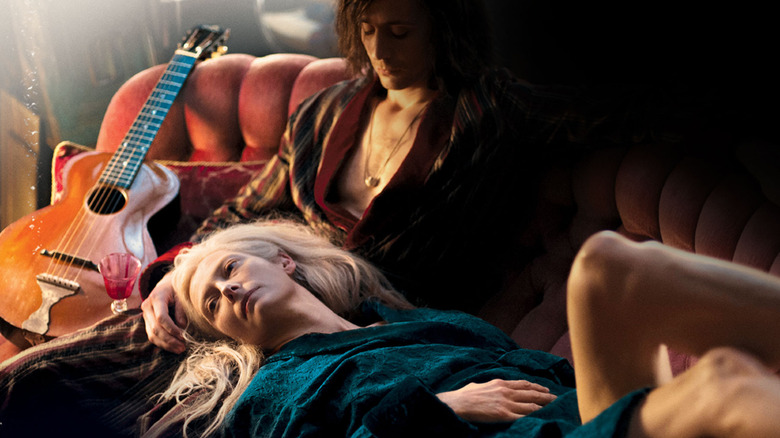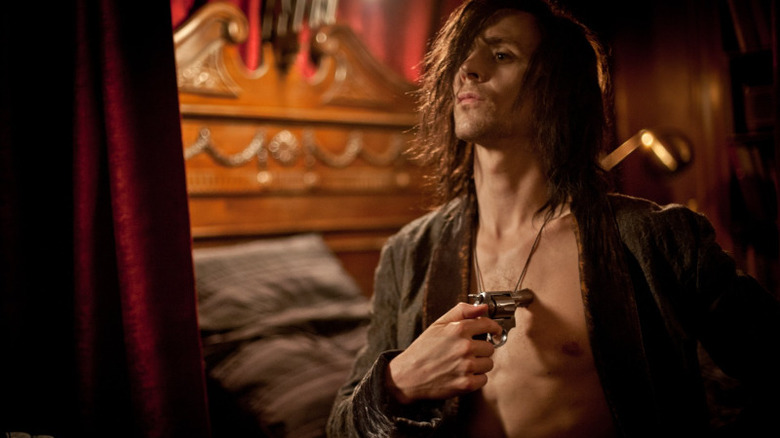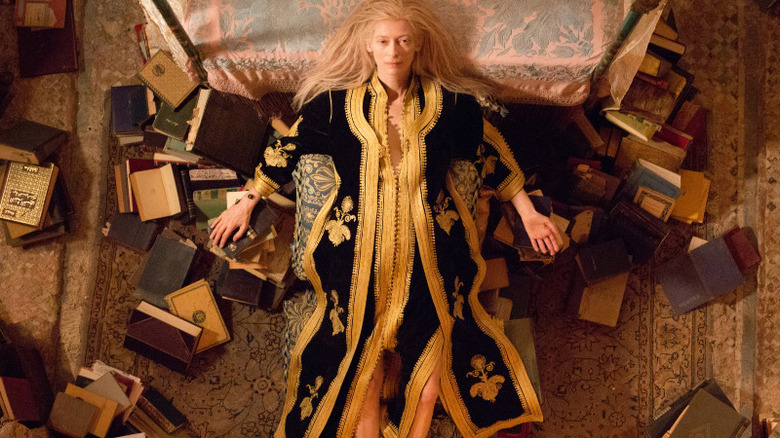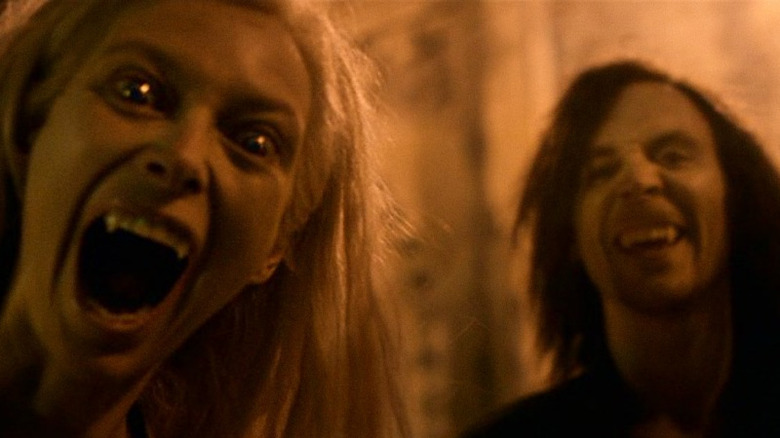Year Of The Vampire: Only Lovers Left Alive Is A Haunting Portrait Of Eternal Love
(Welcome to Year of the Vampire, a series examining the greatest, strangest, and sometimes overlooked vampire movies of all time in honor of "Nosferatu," which turns 100 this year.)
What if time was but a byproduct of the love shared between two people, a culmination of several lifetimes shared together? This haunting, mesmerizing essence permeates Jim Jarmusch's "Only Lovers Left Alive," an entry into the vampire genre unlike any other. As opposed to a traditional horror offering full of fast-paced action and constantly-raised stakes (pun intended), "Only Lovers Left Alive" plays out like an intensely poetic mood piece.
Jarmusch has always been an offbeat director, tending to focus more on the aura than traditional plot structures that move from point A to B, and so on. This essential Jarmusch-ian style was present right from his first major film, "Stranger Than Paradise," to his latest offerings. And "Only Lovers Left Alive" is the epitome of the director's eccentric, yet oh so beautiful, vision.
"Only Lovers Left Alive" centers on vampire couple Adam (Tom Hiddleston) and Eve (Tilda Swinton), who have been together for eons, having experienced the trajectory of human greed, violence, and ruin over time. Living separate lives (Eve in Tangier and Adam in Detroit), the two do not resort to slashing open necks of passersby or ripping off arteries for sustenance — drinking directly from the human bloodstream is deemed dangerous for vampires, as the "contaminated" blood can lead to the death of an immortal. This premise, although quite simple, blossoms in the most profound of ways, culminating in a meditation on nostalgia, art, poetry, culture, and most importantly, love.
What it brought to the genre
"Only Lovers Left Alive" brought a breath of fresh air to the genre, deliberately showcasing an old-school sensibility while enwrapped in the perils of the modern world. It is difficult to gauge when exactly the film takes place, as Jarmusch expertly crafts an atmosphere that oozes bohemian nostalgia: thousands of worn-out books strewn across a room, rare, antique guitars and analog video equipment, ornate glasses that act as chalices for consuming blood, and a feeling of melancholia that exists outside of the limited human constructs of time.
There's little action, almost no gratuitous violence, no perpetual fang-brandishing or animalistic hissing — but one look at these vampires sets them apart from ordinary humans, even if the narrative doesn't explicitly say it. Amid this ever-advancing world, they're becoming obsolete. Adam is a recluse, whose disdain for human aggression almost drives him to a permanent state of sadness. However, the film is not devoid of fun — the perpetual dry humor, especially in the scene between Adam and Dr. Watson (a brilliant Jeffrey Wright, who shines in almost every role) is part of the complex tone of the film, which is interspersed with moments of resignation and tenderness.
Navigating life through the funnel of love
When I saw the opening shot of "Only Lovers Left Alive" for the first time, it stirred up extremely strong emotions within me (repeat viewings have transformed those initial feelings of turmoil into tranquility). This sequence, in which a vinyl record spins on a turntable, playing Wanda Jackson's "Funnel of Love" while shots of Adam and Eve in their separate worlds are woven together seamlessly, captures the core essence of the film.
The ageless couple, though timezones apart, meet each other within the chasm of love. Someone once told me that love is the feeling of being held and feeling free at the same time, and this sentiment is exactly how their relationship can be defined: untethered, yet grounded, deep-rooted, and affirming.
Apart from the central couple, there are a few vampires who appear over the course of the film, the only major character being the playwright Christopher Marlowe (who apparently did write most of Will Shakespeare's plays in secret), played by John Hurt. The humans live in their own bubble, consuming what they are being told to consume. Adam calls humans "zombies," going about life like cogs in an automaton, treating love like a contract or an offhand declaration with no real meaning. For those like Adam and Eve, hauntingly beautiful and ageless beings, these feelings are repulsive and alienating.
This attitude, although steeped in a sense of superiority, is understandable from the lens of a vampire living through the ages, experiencing all that existence has to offer. However, the point of "Only Lovers Left Alive" is not to condemn humanity, but to try to make sense of the pain that is part and parcel with existence, whether you're a mere mortal or a 1000-plus-year-old ageless being.
Cast out of the Garden of Eden
After all, humans are not just characterized by their limitations — several humans in the film are extremely kind to Adam and Eve, especially those in Tangier who are aware of her true identity. This act of kindness does not stem from fear, but from genuine empathy and respect. Eve understands and values this, inspiring her to visit Adam to make him realize the wonders that life has to offer, even as she still shares many of his condescending views toward humans. This is mostly because the couple views humans as a means to an end, even as they gorge on the coveted O-negative blood and immerse themselves in the beauty of human creation.
However, the pitfalls of their pretension are exposed, when Eve's sister Ava (Mia Wasikowska) arrives and shatters the idyll that only the powerful and privileged can get lost in. After all, they are vampires, it is in their nature, their DNA, to feast on humans, both for sustenance and a drug-like high. This sense of aggressive, predator-like hedonism marks the film's end, as no amount of supernatural superiority can undercut the fact that they end up preying on innocent victims — lovers — sapping out their lifeforce for continued existence.
Isn't that an act of transgression against love, a betrayal of their own "civilized" notion of existing? Is this what we do on the daily, under the guise of well-meaning intentions, which are only masks to conceal the horrors deep within? The answers are tough and difficult to parse, but through the languid visual and metaphorical poetry of "Only Lovers Left Alive," it takes the edge off the horrific epiphany in the end (a false consolation, but beautiful to behold on screen).
I just hope that amid the horrors of life, the human race can hold on to a semblance of hope and acceptance. After all, we are truly the only lovers left alive on this giant blue rock in the middle of nowhere.



